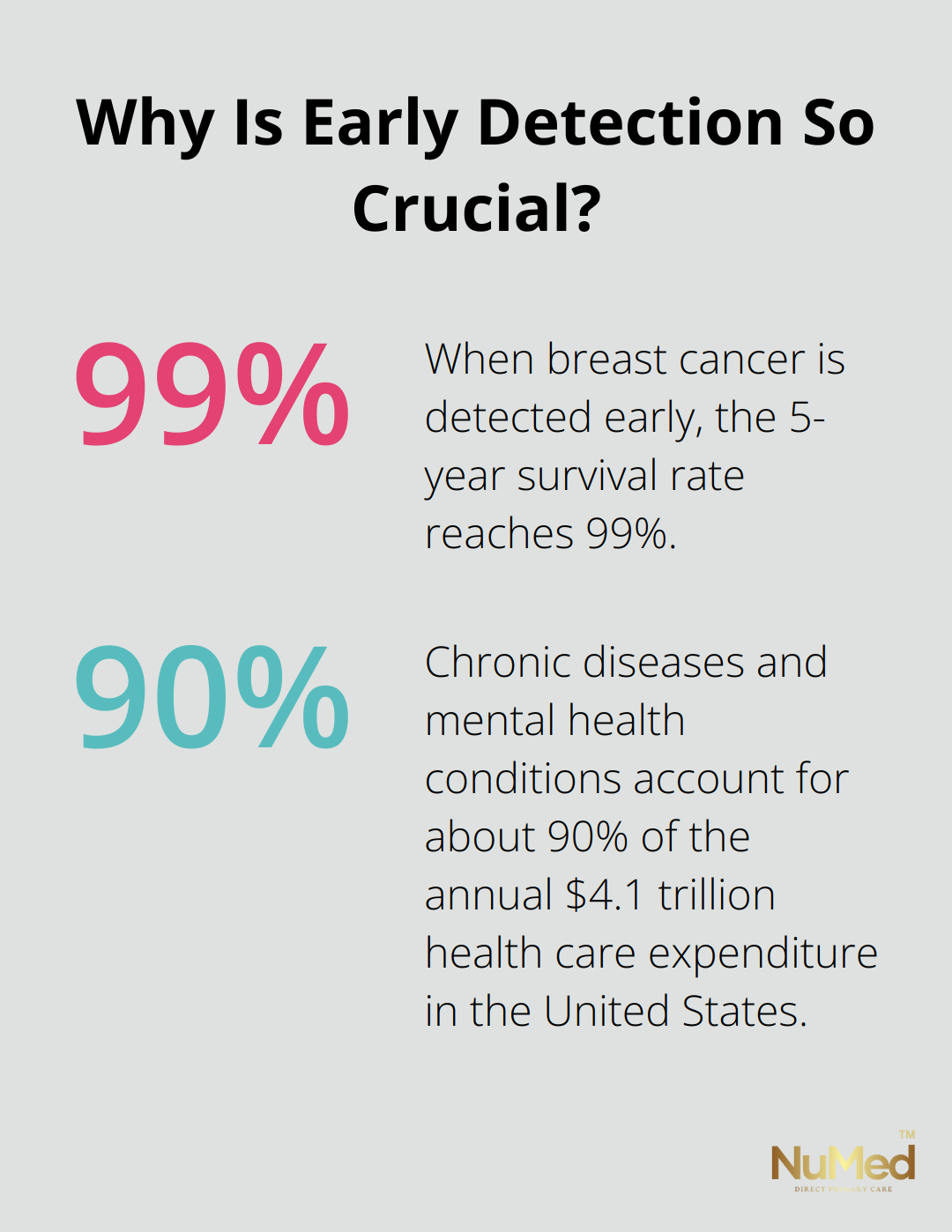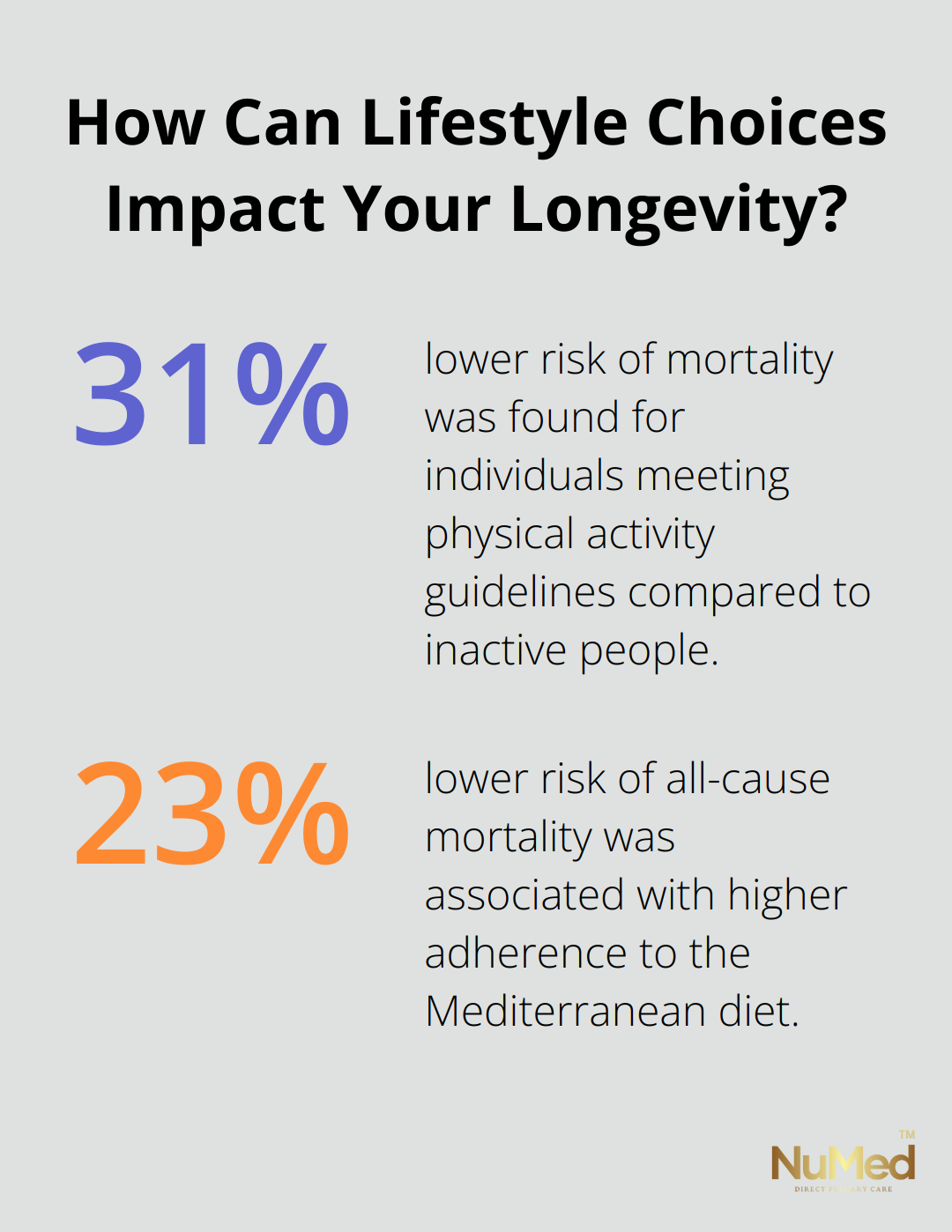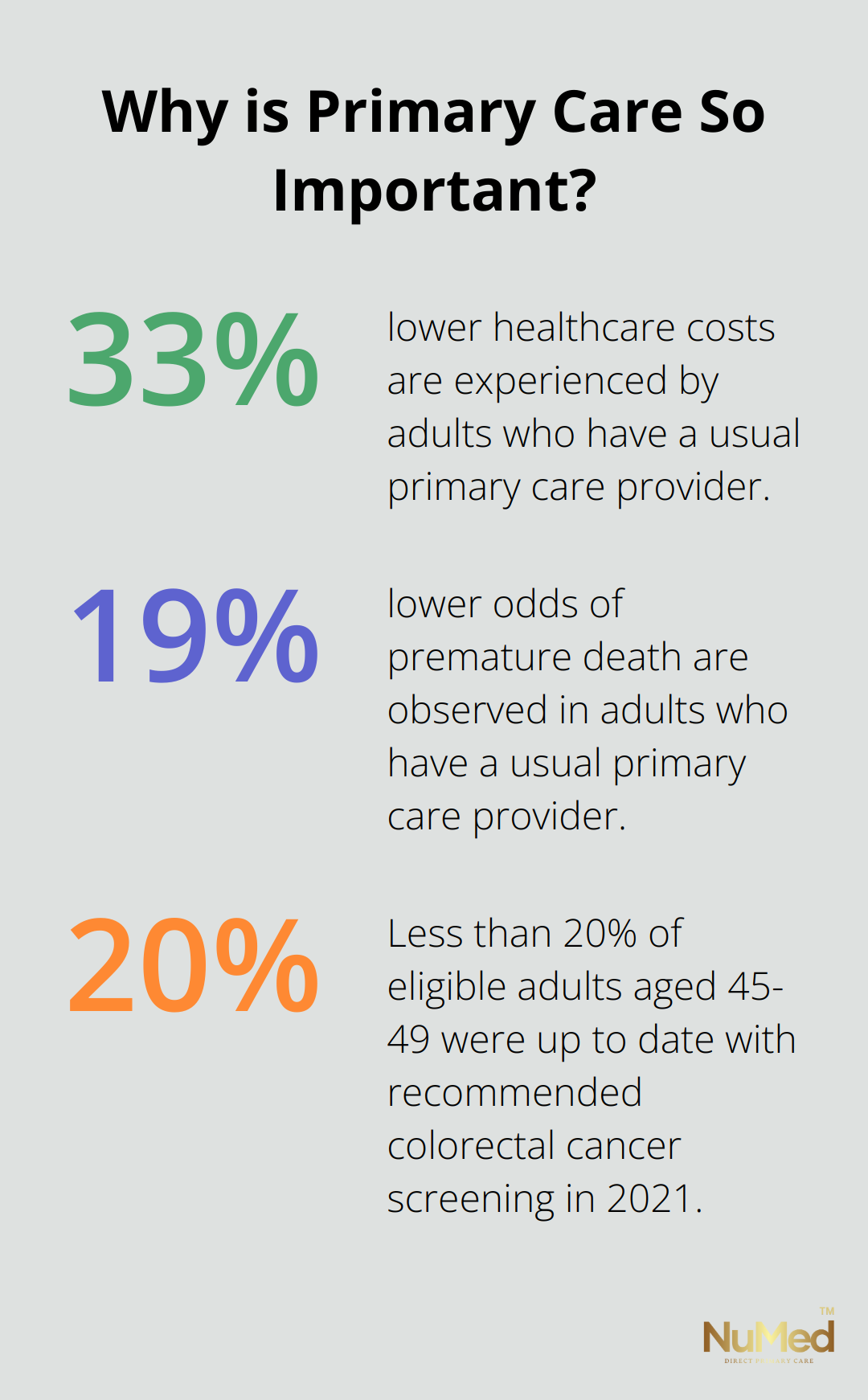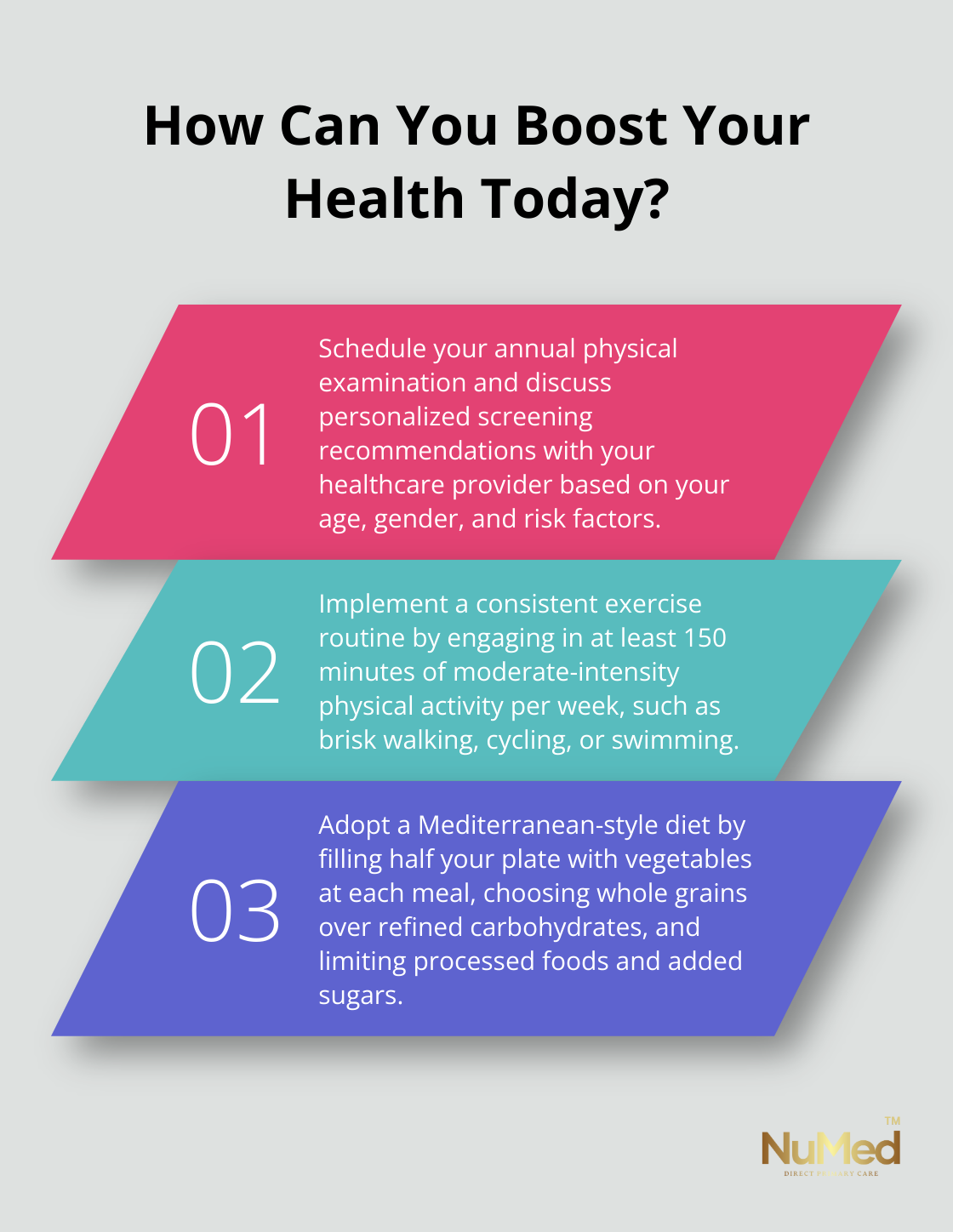At NuMed DPC, we believe that preventive healthcare is the cornerstone of a healthy life. Preventive healthcare includes health-promoting behaviors, screening, and proactive measures to maintain wellness and catch potential issues early.
By focusing on prevention rather than treatment, we can significantly improve health outcomes and reduce healthcare costs for individuals and society as a whole. This blog post will explore the key aspects of preventive care and provide practical tips for incorporating these practices into your daily life.
Why Preventive Healthcare Matters
Defining Preventive Healthcare
Preventive healthcare represents a proactive approach to maintaining wellness and avoiding illness. This comprehensive strategy includes regular check-ups and screenings, and lifestyle choices that promote good health. The primary goal of preventive care is to identify potential health issues early or prevent them entirely.
Individual Benefits of Preventive Care
For individuals, preventive healthcare offers substantial advantages. Regular screenings can detect diseases such as cancer, diabetes, and heart conditions in their early stages when treatment is most effective. The American Cancer Society reports a striking statistic: when breast cancer is detected early, the 5-year survival rate reaches 99%. This fact highlights the life-saving potential of preventive measures.

Preventive care also empowers individuals to take control of their health. Through regular check-ups, patients can collaborate with their healthcare providers to develop personalized wellness strategies. These may include nutrition plans, exercise regimens, or stress management techniques tailored to specific needs and risk factors.
Societal Impact of Prevention
The benefits of preventive healthcare extend far beyond individual well-being. When a population embraces preventive care, it leads to healthier communities and reduces strain on healthcare systems. The Centers for Disease Control and Prevention (CDC) estimates that chronic diseases and mental health conditions account for about 90% of the annual $4.1 trillion health care expenditure in the United States. A focus on prevention can significantly reduce this burden.
Economic Advantages of Preventive Care
From a financial perspective, the case for preventive care is compelling. A study published in the American Journal of Preventive Medicine found that for every dollar spent on preventive services, $2.71 is saved in future healthcare costs. This return on investment is particularly significant when considering conditions like type 2 diabetes, where prevention through lifestyle changes can avoid costly treatments and complications.
The Role of Healthcare Providers
Healthcare providers play a crucial role in promoting and implementing preventive care strategies. They educate patients about the importance of regular screenings, vaccinations, and healthy lifestyle choices. Providers also help patients navigate the complex landscape of preventive services, ensuring they receive appropriate care based on their age, gender, and risk factors.
As we move forward, it’s clear that preventive healthcare isn’t just about avoiding illness; it’s about optimizing health and quality of life. The next section will explore specific preventive behaviors that individuals can adopt to enhance their overall well-being and reduce their risk of chronic diseases.
How to Optimize Your Health Through Preventive Behaviors
Adopting key preventive behaviors is essential for maintaining optimal health. These practices reduce the risk of chronic diseases and enhance overall well-being and quality of life.
Physical Activity: The Foundation of Health
Regular physical activity forms a cornerstone of preventive health. The World Health Organization recommends at least 150 minutes of moderate-intensity physical activity per week. This can include brisk walking, cycling, or swimming. Adults should also incorporate strength training exercises at least twice a week to maintain muscle mass and bone density.

A study published in the Lancet found that individuals who met these physical activity guidelines had a 31% lower risk of mortality compared to those who were inactive. To make exercise a habit, start small and gradually increase intensity. Find activities you enjoy (dancing, hiking, or team sports) to make fitness more sustainable.
Nutrition: Fuel Your Body Right
A balanced diet prevents numerous health issues. The Mediterranean diet, rich in fruits, vegetables, whole grains, lean proteins, and healthy fats, has consistently linked to lower rates of heart disease, stroke, and certain cancers. A study published in JAMA Network Open showed that higher adherence to the Mediterranean diet was associated with 23% lower risk of all-cause mortality.
Practical tips for improving nutrition include:
- Fill half your plate with vegetables at each meal
- Choose whole grains over refined carbohydrates
- Limit processed foods and added sugars
- Stay hydrated by drinking water throughout the day
Mental Health: The Mind-Body Connection
Mental health integrates overall well-being. Chronic stress can lead to various health problems, including cardiovascular disease and weakened immune function. Implementing stress management techniques is important for preventive health.
Mindfulness meditation has shown promising results in reducing stress and anxiety. A study in JAMA Internal Medicine found that mindfulness programs led to moderate improvements in anxiety, depression, and pain. Try 5-10 minutes of daily meditation and gradually increase the duration.
Other effective stress management practices include:
- Regular exercise
- Maintaining social connections
- Engaging in hobbies or creative activities
- Seeking professional help when needed
Sleep: The Unsung Hero of Health
Adequate sleep often gets overlooked but plays a vital role in overall health. The National Sleep Foundation recommends 7-9 hours of sleep per night for adults. Poor sleep has been linked to increased risk of obesity, diabetes, and cardiovascular disease.
To improve sleep quality:
- Stick to a consistent sleep schedule
- Create a relaxing bedtime routine
- Limit screen time before bed
- Keep your bedroom cool, dark, and quiet
Avoiding Harmful Substances
Tobacco use remains a leading cause of preventable death worldwide. Quitting smoking can dramatically reduce the risk of lung cancer, heart disease, and stroke. The CDC reports that within one year of quitting, the risk of heart attack drops significantly.
Excessive alcohol consumption is another major health risk. The Dietary Guidelines for Americans recommend limiting intake to up to one drink per day for women and up to two drinks per day for men.
Implementing these preventive behaviors can significantly improve your health outcomes. However, preventive behaviors alone are not enough. Regular health screenings and check-ups play a critical role in early detection and prevention of diseases. Let’s explore the essential screening tests and check-ups that complement these healthy behaviors in the next section.
Essential Screenings for Optimal Health
The Power of Regular Check-ups
Annual physical examinations form the foundation of preventive healthcare. These visits allow healthcare providers to assess overall health, review medical history, and perform basic screenings. Adults who have a usual primary care provider experience 33% lower healthcare costs and 19% lower odds of premature death compared to those who only seek care from specialists (as reported by the Centers for Disease Control and Prevention).
Age and Gender-Specific Screenings
Different life stages require specific health screenings. Women should start cervical cancer screening through Pap smears at age 21 and continue every three years until age 65. Mammograms for breast cancer screening should begin at age 45 for women at average risk. Men should consider prostate cancer screening from age 50, or earlier if they have risk factors.

Both genders should undergo colorectal cancer screening starting at age 45. Less than 20% of eligible adults aged 45-49 were up to date with recommended colorectal cancer screening in 2021.
Heart Health Assessments
Cardiovascular disease remains a leading cause of death worldwide. Regular blood pressure checks, cholesterol screenings, and diabetes tests are essential for heart health. The American Heart Association recommends blood pressure screening at each regular health care visit or at least once per year if blood pressure is less than 120/80 mm Hg.
Immunizations: Your Disease Shield
Vaccinations play a vital role in preventive healthcare. Adults should receive annual flu shots, tetanus boosters every 10 years, and the shingles vaccine after age 50. During the COVID-19 pandemic, vaccination rates for other preventable diseases declined. It’s important to catch up on any missed vaccinations to maintain optimal protection against preventable diseases.
Personalized Screening Recommendations
Healthcare providers can offer personalized screening recommendations based on individual risk factors and health history. These tailored approaches (which may include genetic testing or specialized imaging) empower patients with the knowledge and tools to maintain optimal health through proactive screening and preventive care.
Final Thoughts
Preventive healthcare includes health-promoting behaviors, screening, and proactive measures that form the foundation of a healthier life. These practices reduce the risk of chronic diseases, detect potential health issues early, and improve overall quality of life. Communities that prioritize prevention experience reduced healthcare costs, decreased strain on medical systems, and improved public health outcomes.

Regular physical activity, balanced nutrition, stress management, adequate sleep, and avoiding harmful substances contribute to optimal wellness. These lifestyle choices enhance physical health and improve mental and emotional well-being. Regular health screenings and check-ups allow for early detection of potential health issues when they are most treatable.
NuMed Direct Primary Care supports patients on their journey to better health through our direct primary care model. We focus on preventing illness by addressing root causes and fostering a personalized connection between patient and practitioner. Our services include extensive lab work, functional medicine, and health coaching (tailored to individual needs for optimal health outcomes).
















